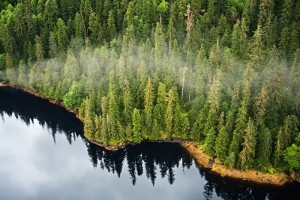For Immediate Release
October 12, 2015
Contact:
Gabe Scott, Cascadia Wildlands, (907) 491-0856, gscott@cascwild.org
Becky Knight , GSACC, (907) 772-9391, bknight15@hotmail.com
Oliver Stiefel, Crag Law Center, (503) 227-2212, oliver@crag.org
Larry Edwards, Greenpeace, (907) 747-7557, ledwards@greenpeace.org
Randy Spivak, Center for Biological Diversity, (310) 779-4894, rspivak@biologicaldiversity.org
Patricia O’Brien AWA-SE chapter, (907) 789-9405, patriciaobrien@gci.net
PETERSBURG, Alaska — In a federal court filing last Friday the U.S. Forest Service announced it will withdraw its decision on the Mitkof Island Project, a large 35 million board foot timber sale. The project is in the center of the Tongass National Forest, near the communities of Petersburg and Kupreanof.
Petersburg District Ranger Jason Anderson signed the Forest Service’s decision in March. In May five environmental organizations filed the lawsuit, GSACC v. Anderson. They are the Greater Southeast Alaska Conservation Community, Cascadia Wildlands, Center for Biological Diversity, Greenpeace, and the Alaska Wildlife Alliance. The organizations are represented by Chris Winter and Oliver Stiefel of Crag Law Center (Portland) and Gabriel Scott, Cascadia Wildlands’ Alaska legal director.
 “Faced with the realities brought forth in our lawsuit, the Forest Service is withdrawing the Mitkof project rather than defend it in court. This is a victory for old growth, wildlife, and subsistence hunters, although we don’t yet know whether the agency will attempt resurrecting the project with future planning,” said Cordova-based Gabriel Scott of Cascadia Wildlands.
“Faced with the realities brought forth in our lawsuit, the Forest Service is withdrawing the Mitkof project rather than defend it in court. This is a victory for old growth, wildlife, and subsistence hunters, although we don’t yet know whether the agency will attempt resurrecting the project with future planning,” said Cordova-based Gabriel Scott of Cascadia Wildlands.At issue in the lawsuit is the harm caused by logging old-growth and to the species dependent on old growth forests including Sitka black-tailed deer-an essential resource for subsistence hunters-the Alexander Archipelago wolf, and the Queen Charlotte goshawk.
Petersburg resident Becky Knight of GSACC said: “Mitkof Island has been hard hit by 60 years of industrial logging. Subsistence hunters from the community rely on deer as a primary source of protein, but for years have been faced with critically low deer populations and severe harvest restrictions. This area of the Tongass needs a long period of recovery, but this sale targeted some of the few remaining stands of important winter deer habitat.”
Randi Spivak with the Center for Biological Diversity said, “During the planning process for this sale, the Forest Service tried to downplay and hide from the public the full scope of the damage this logging would cause.” Spivak added: “The agency initially told the public this was a ‘small sale’ involving only a local logging opportunities, but the project ballooned to a major timber sale designed for a large regional or out-of-state timber operator.”
“The Forest Service must take a hard look at the environmental consequences of its actions, especially with respect to species like the deer and the goshawk that depend on old-growth forests,” said Oliver Stiefel of Crag Law Center. “In a rush to approve yet another major old-growth timber sale, the Tongass National Forest brushed aside these environmental concerns and fast-tracked the project.”
In the court filing, the Forest Service asked for an extension of the briefing schedule in the case to give the agency time to formalize its withdrawal notice. The extension request is for 60 days.
(Tongass National Forest photo by US Forest Service)
####
